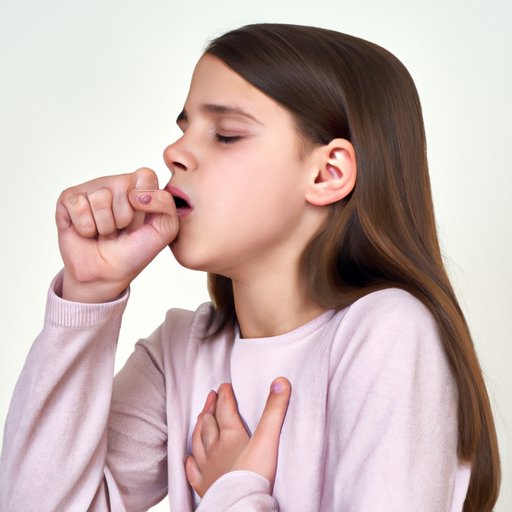
I. Introduction
Coughing is not only annoying but also contagious. When you have a cough, you can easily spread germs around you, which can lead to other people getting sick. In this article, we’ll explore the science of coughing and contagiousness, experts’ opinions on how long someone with a cough is contagious, best practices to prevent spreading cough-causing germs, symptoms, caring, common myths, and practical tips for effective treatment.
II. Exploring the Science: Understanding the Mechanism of Coughing and Contagiousness
Coughing is our body’s way to clear the airways and get rid of unwanted substances, such as mucus, dust, or irritants like cigarette smoke. However, coughing can also spread germs through the air. Different types of coughs – such as dry or wet coughs – pose a different level of contagion risks. People with weaker immune systems, such as children and the elderly, are more prone to contagious coughs than others.
III. How Long Can You Expect to be Contagious with a Cough: Insights from the Experts
According to experts, people with a viral respiratory infection, such as a cold or flu, can spread the virus up to 7 days after the onset of the illness. However, people with pertussis (whooping cough) can stay contagious for up to 3 weeks, while those with tuberculosis can remain contagious for months or years if not treated properly. The duration of contagiousness also depends on personal hygiene, how well you follow preventive measures, and the reach of your coughing.
IV. Tips to Avoid Infection: Best Practices to Prevent Spreading Cough-Causing Germs
General hygiene practices like washing hands frequently, covering mouth and nose when coughing or sneezing, and avoiding touching the face and mouth can help reduce the spread of germs. To be more specific, sneezing into a tissue instead of your hands, regularly sanitizing high-touch surfaces like doorknobs and phones, and wearing a mask in public, especially during flu season, can help prevent the spread of cough germs. If you’re sick, avoid going to public events and practice social distancing whenever possible to avoid infecting others.
V. Symptoms and Caring: Dealing with Coughs and Contagiousness – What You Need to Know
The symptoms of coughs vary from person to person but may include fever, fatigue, sore throat, chest discomfort, and difficulty breathing. Self-care and symptomatic management strategies are recommended such as drinking plenty of fluids, getting enough rest, using cough suppressants, taking over-the-counter pain relievers, and avoiding exposure to environmental irritants. If symptoms persist or get worse, seek medical help immediately.
VI. Debunking Myths: Common Misconceptions About Coughs and Contagion
Some common misconceptions about coughs and coughing hygiene may include the idea that coughing into your hands is ok or that vaccines cause the flu. In reality, coughing into your hands simply transfers germs from your mouth to your hands which then spread more easily. Vaccines cannot cause the flu, and they’re the most effective way to protect yourself and those around you.
VII. Managing Coughs and Contagiousness: Practical Advice for Effective Treatment
To manage coughs and contagiousness, stay home from work or school, drink plenty of fluids, and use over-the-counter remedies to control symptoms and ease discomfort. Good sleep and stress management can also help the body fight off illness more efficiently. If symptoms persist, seek medical advice through telemedicine or an in-person medical consultation.
VIII. The Impact of Coughs and Contagiousness: Implications for Workplaces and Public Places
The spread of contagious illnesses can have a significant impact on the economy, especially in workplaces that require physical interaction. To control the spread of cough-causing germs, employers, employees, and venue managers can practice good hygiene, respect social distancing, encourage sick leave, and use teleworking or teleconferencing when possible.
IX. Conclusion
Coughing is not something to be taken lightly. It can be annoying and contagious but with the right knowledge and proactive measures, you can manage it effectively and prevent the spread of germs. Always practice good hygiene, use preventive measures, take care of yourself, and seek medical help when necessary.




